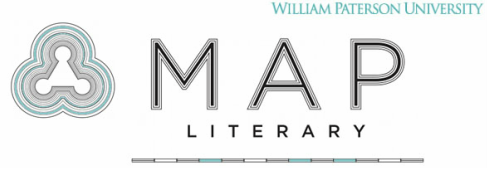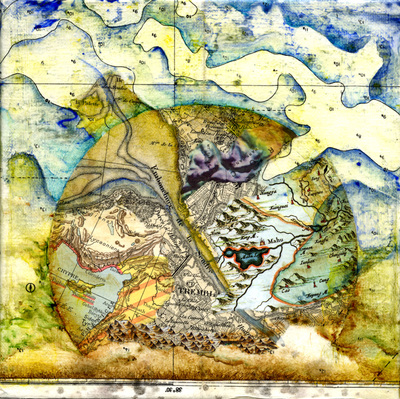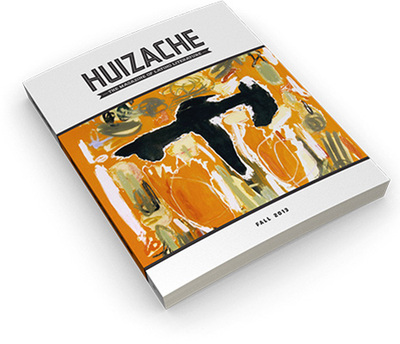SEAN TROLINDER
MLA Citation Gone Wild--Shakespeare in Love: A Sexy Essay
OKAY, PROFESSOR JOHNSON, imagine yourself living in Elizabethan Britain during the peak of the Renaissance, and none other than Shakes himself writes a sonnet about you. Perhaps Shakes had eyes on you for only a handful of days and you crack open his dam of creativity when rivers of words flow and are touched by morning sunrays that glisten like fresh glass. Out comes a nicely polished sonnet, where Shakespeare compares “thee to a summer’s day” (Shakespeare, “Sonnet 18,” line 1).1 In John Madden’s Shakespeare in Love (1998), young Shakes cheats on his wife, Anne Hathaway, who banished him from Stratford-upon-Avon.2 He wants to make love to every woman who flaps eyes at him, seducing them with what John Berger calls “the male gaze” (qtd. in Thornham 4). As author Bell Hooks notes, “There is power in looking” (115). At first, he wants to make Rosaline, who is actor Richard Burbage’s mistress, “immortal” (Shakespeare in Love). After sneaking around and finding Tilney making “the beast with two backs” (Shakespeare, Othello 1.1.130-131) with Rosaline, he refuses to accept her as a muse. While struggling with writer’s block, like I’ve been doing for the past hour writing this essay, Shakes finds the inspiration to draft Romeo and Juliet through wooing Viola De Lesseps. After several sessions in the sack and silly swappings of saliva and contradictory words, Shakes finishes his masterpiece, but finds that his courtship of Viola is only “a stolen season” (Shakespeare in Love), since she’s to marry some dude named Wessex.3 For all its hard to understand language, the thing that interested me the most was the sword fights and the shocking amounts of sex. Also, I’m surprised this movie won a Best Picture Oscar over something as dope as Saving Private Ryan. Shakespeare in Love successfully frames sex as a channel toward creativity, since Shakes writes his most famous play and poem through sheer acts of lust.
For starters, Shakes writes Romeo and Juliet during several bouts of night wrestling with Viola, in which the director John Madden, not the football coach, frames Gwyneth Paltrow half naked. However, to make every word perfect, they tend to work at the Rose during the day, counting down the seconds until night. The sun is the enemy, keeping them away from ravaging each other’s bodies, but the night is their friend. All of this inspires the famous balcony scene, “what light through yonder window breaks” (Shakespeare, Romeo and Juliet 2.2.2).4After many frames of Paltrow’s breasts and Shakes on his back, the play comes together and they begin rehearsing the masterful scene. According to Lionel Ringwald, an adjunct at Johnson County Community College, “Shakespeare can’t seem to find inspiration from the mere necessity of being broke. As evident in an early scene with a psychiatrist, a muse is necessary, or the very fire that brings life to his plays. He ends up sliding his name into a bracelet that he gives to Rosaline to keep him on edge, but this is all but forgotten by him after moving onto Viola” (54).5 In his quest for a muse, Shakes gets in trouble with Burbage, who discovers Shakes’ name inside Rosaline’s snake bracelet, which led to an all hell breaks loose sword fight between the Admiral’s Men and the Lord Chamberlain’s Men. Rick Mantar says, “The fact a bunch of actors would engage in combat over their playwright and actor represents the brewing hatred between the rival companies. Since a lady was at stake, too, it hinted at the actors’ pent up sexual energy, since they were away from women for close to seven or eight hours a day” (235). Mantar’s right about pent up energy, since Shakes runs away from the company many times throughout the movie to spin poetic gold into his scenes. However, he does stand up to Burbage to protect his honor for a moment, only to hide out under the trapped door to make out with Viola, who again is disguised as Kent. Like the Capulets and Montagues, the actors in the two play companies have each other’s backs. The sword fighting gives that extra charge needed to make the classic fight between Tybalt and Mercutio memorable.6
Next, Shakes’ lust for Viola was foiled by her commitment to the devil himself, Wessex, the man with a funny name, but it’s important because it helps create the ending of Romeo and Juliet. You see, Viola hates Wessex and even slaps him for kissing her. What makes it even more stupid is that Viola’s parents are willing to pay him to take her off their hands, when they could have just given her to Shakes for free. That sounds a bit misogynist, or whatever that word we use in class means, but she loved Shakes, so they deserved to be together. Shakespeare in Love reminds me of how I can’t be with Stephanie Shipman, since back home, she’s a Jehovah’s Witness and her family won’t allow her to marry anyone outside the congregation. Supposedly, John Keiserman is part of the church, yet he acts like anything but a religious creature. He attends keggers, cheats on essays7, and sleeps around behind Stephanie’s back. Like Don John says in Much Ado about Nothing, “I am not [a man] of many words” (Shakespeare, Much Ado about… 1.1.154), but my heart’s a lot like Shakes’ own and Keiserman is my Wessex. Anyway, Stephanie informed me last night before completing this essay that her church has agreed to let her and John get married, even though they both know about cheating on one another. According to Stephanie’s pastor, “People belong with their own. Outsiders will collapse your faith” (Ogletree). Since Shakes, who is still married himself, and Viola can’t be together, he decides to write the ending of Romeo and Juliet, where Juliet pretends to have died of a poison, but it is just a sleep potion. Distraught, Shakes buys poison from the apothecary, drinks it next to Juliet’s body, and dies. When Juliet wakes up, she’s incredibly sad, so she commits suicide by stabbing herself with Romeo’s dagger. In the article, “Shakespeare’s Tragedies Ranked,” Daniel Plummer claims, “The suicides of Romeo and Juliet seem a bit ridiculous, given that they only knew each other for a few days. It is a tragedy itself that this play is taught in high school, sending the wrong message to youths when they have their entire lives ahead of them” (92). Though I agree with Plummer that the suicides are rather quick, maybe what Shakes is getting at is that love can either conquer all or defeat all. Since their families were unaccepting of one another, the deaths implied a defeatist attitude, since you can’t change stubborn. Stephanie’s family is stubborn and will not even consider me appropriate for her, since they’d see my attempt to convert into a Jehovah’s Witness as a sly way of stealing her away.8
At one point in Shakespeare in Love, in between rehearsals, Shakes decides to write “Sonnet 18” for Viola, since he’s having a hard time keeping his dick in his pants. Before running upstairs and applying quill to ink, Shakes was all over Viola’s body, even though this was the clearest moment when Gwyneth Paltrow resembled a man (again, she’s disguised as Kent). I’m starting to think Shakes was a bit bisexual, but that’s for another essay. According to psychologist Damien Georgiossis, “The longing for flesh can cause lovers to quarrel and necessary distractions to emerge. For artists, they channel this longing into art, often in forms of poetry or abstractionist paintings. These forms are the artists’ ways of sorting out these feelings until it is time to do the deed” (322). In a quick shot of Viola alone, she recites Shakes’ famous lines, “Shall I compare thee to a summer’s day / Thou art more lovely and more temperate / Rough winds do shake the darling buds of May” (qtd. in Shakespeare in Love). It is clear that “Sonnet 18” is supposed to be about Viola and she’s enchanted by the poem. This makes their ravaging session that night even more ferocious and the movie borders getting an X-rating at this point, so much so that Shakes gets craftier not only with his art, but with his pelvic thrusts.9
To reiterate, I expect an “F” for this essay and even though Shakespeare in Love is not as good as Saving Private Ryan, I understand that the movie is sexy and I have a better understanding about why Shakes wrote Romeo and Juliet. I’ll need to move on from Stephanie, I guess, but I see a lot of what critic Steven Pernowski called “universal appeal” with this one (5-B). If it were not for Shakes’ poetry, we’d never have future geniuses like J. Cole.10 I see John Keiserman as being this university’s Wessex, Stephanie’s my Viola, and I wish that I got as much play as the ultimate player—Master Shakes. I tried writing that cafeteria poem, freestyling like a modern rapper, but I need to study sonnets. Maybe they’re the key to a woman’s heart. I still think Stephanie’s the one and she told me that “my heart is with you, but I have a duty to my church and family, so I’m to marry stupid John” (Shipman). I wonder if I can move on from her as quickly as Shakes did from Viola, but I plan on carrying out an affair. So again, I ask, would you give love a chance if Shakes had written a sonnet for you? 11
1. Let’s be honest, Professor Johnson, I’m only doing this essay as a requirement and find Shakespeare as dull as watching my dad mow the lawn, but you once claimed his poetry speaks to the heart. You’ll probably hate this “grabber,” but it’s the best I’ve got. Since I’m trying to woo Stephanie Shipman and she drooled over excerpts about Twelfth Night, I’m trying to take your advice. By the way, the ending of Shakespeare in Love is bullshit. Viola De Lesseps did not inspire Twelfth Night. You told me to only use MLA citation in this essay, but I’m including footnotes, since I think how Shakes influenced my quest for Stephanie is far more interesting than some stupid college essay that will be tossed aside like Shakes’ drafts during writer’s block.↩
2. So check it, Professor Johnson, I was confused by these famous names. I was wondering why the legendary football coach, John Madden, a Raider through and through, would direct a movie, much less one about Shakes fornicating behind his wife’s back. Through my research on Wikipedia (which you said we can’t use as a source, so I’m putting it in the footnotes), this is not the same John Madden. I saw his version of Ethan Frome in high school, which was terrible, since I had to write an essay on the book which I never read. I got an “F” on it, which I’m projecting to be the exact grade on this one. I found it hard to believe that the actress Anne Hathaway was married to Shakes, too, since they didn’t exist in the same era, but again, Wikipedia helped me understand they’re different people. You see, sometimes Wikipedia is the best source!↩
3. I have a confession to make. To find any inspiration to write this essay, I made love to Stephanie in my dorm room. My roommate was out for the weekend, so she came over in the middle of the night to watch this film with me. Anyway, as we paused in the middle of it, where she pretended to be Viola in disguise as Kent and I as Shakes, I recited the whole part about her bosom being like “golden apples” and how “for one kiss, I would defy a thousand Wessexs” (Shakespeare in Love). In an instant, she was all over my nuts like cream on a banana split. I remembered you said something about “objectification” (Johnson) during The Merchant of Venice and I kind of felt that way the other night, violated or something. Was Stephanie into me or the words of some screenwriter named Tom Stoppard?↩
4.It inspired me to be a player’s fool one night outside of Stephanie’s sorority house. I tossed pieces of mulch at her window. A light flickered on and I recited lines from J. Cole’s “Crooked Smile.” I was like, “Take it from a man that loves what you got, and baby girl, you’re a star. Don’t let ‘em tell you you’re not. Now is it real? Eyebrows, fingernails, hair? Is it real? If it’s not, girl, you don’t care. Cause what’s real is something the eyes can’t see” (Cole). She folded her arms, told me to shut up, and recite the window scene. Since I didn’t know it verbatim, she said, “Get lost” (Shipman) and slammed the window.↩5. Stephanie has a boyfriend named John Keiserman. I think he was a student of yours in Advanced Shakespeare. Between you and I, that dumbass cheated, since Stephanie wrote those papers for him. Anyway, a few nights after my failed attempt to woo her with J. Cole (who is every bit a better poet than Shakes), I met her at an anti-violence art gallery and she was crying over a picture about Trayvon Martin and his hoodie. We got to talking about how Zimmerman should have went to jail, and all the while, I slipped my number into her purse. She called me four days later, chewing me out because John temporarily broke up with her for finding my number. I mean, why was he snooping in her purse to begin with? How am I any different than these characters Shakes creates that plot miraculous acts of match making? Oh yeah, because I’m doing it for myself.↩
6. You’re going to ask why as a margin comment, but I don’t know. No one stuck up for me when John’s frat jumped me. One day after your class, those goons waited for me outside the Drainer Building, followed me half a block, and attacked me in an alley. You asked one day, “Arturo, how did you get those bruises on your face?” (Johnson) and now you know. Stephanie took pity on me and that’s how it really started between us, I think. She was worth fighting for.↩
7.Do you remember how in the movie Wessex makes a fifty pound wager that there can’t be a play out there that captures the true meaning of love? I’m willing to wager fifty pounds with you, Professor Johnson, that you’ll give me a worse grade for an essay I did and poured sweat over than you did for an essay John didn’t even write himself.↩
8. I’m not going to lie, that would be my plan all along if I joined the church, but it is dumb that we still live in a society where religious organizations can decide who a woman can marry, right? Shouldn’t she be independent and choose a hot young stallion like me?↩
9. I need extra credit, so I’m sharing a poem that I wrote for Stephanie about a time when we ate lunch together. It goes a little something like this:
Thou art sip that milkshake
And drain the key lime green from brim to bottom
With plush lips full of vigor and as ripe as velvet
An image so tantalizing that its like smut and stem
Blossoming from a glass of sweetness.
May simple joy remain still in the capsule of time
And the humble task of drinking everlasting. (Hugo)↩
10. Even though Stephanie’s a Jehovah’s Witness, I hope that she comes around and accepts J. Cole as the modern day Shakes. He’s better than those posers, like Jay-Z, Kodak Black, and Kanye West. You can agree with me on that, right?↩
11. Please have mercy on me. My heart is broken, and my tale is “one told by an idiot, full of sound and fury, signifying nothing” (Shakespeare, Macbeth 5.5.29-31).↩
Cole, J. “Crooked Smile.” Born Sinner, Columbia, 2013.
Georgiossis, Damien. “Neurological Approaches to Creativity in Repressing Sexual
- Stimulation.” Psychological Journal of the Starving Artist, vol. 17, no. 3, 2016.
Hooks, Bell. “The Oppositional Gaze: Black Female Spectators.” Black Looks: Race and
- Representation. Boston: South End, 1992.
Hugo, Arturo. “Stephanie’s Mint Milkshake.” Baltimore: Arturo Hugo’s Notebook, 2017.
- Johnson, Patricia. Personal Interview. 14 Sept. 2017.
- ---. Personal Interview. 28 Sept. 2017.
Mantar, Rick. “Manning Up: Rival Companies in Madden’s Shakespeare in Love.” Rough
- Goodman Magazine, Egerton & Swartz’s Publishing, 2007, pp. 231-42.
Ogletree, Zachariah. Personal Interview with Stephanie Shipman. 20 Nov. 2017.
Pernowski, Steven. “Renaissance with Heart.” Review of Shakespeare in Love, directed by
- John Madden. The Bismarck Social Eagle, 11 Dec. 1998, pp. 5-B.
Plummer, Daniel. “Shakespeare’s Comedies Ranked.” The Wild Goose, May-June 2014,
- pp. 92-7.
Ringwald, Lionel. “To Break Writer’s Block: The Function of the Muse in Shakespeare in
- Love.” Ragtime Scholarly Quarterly, vol. 7, no. 2, 2001, pp. 52-61.
- Shakespeare, William. Macbeth. New York: Simon & Schulter, 1992.
- ---. Much Ado about Nothing. New York: Simon & Schulter, 1995.
- ---. Othello. New York, Simon & Schulter, 1993.
- ---. Romeo and Juliet. New York, Simon & Schulter, 2004.
- ---. “Sonnet 18.” Shakespeare’s Sonnets. New York, Simon & Schulter, 2004.
- Shipman, Stephanie. Personal interview. 3 Sept. 2017.
- ---. Personal Interview. 12 Dec. 2017.
Shakespeare in Love. Directed by John Madden. Miramax, 1998.
Thornham, Sue. Feminist Film Theory: A Reader. Edinburgh: Edinburgh UP, 1999.










